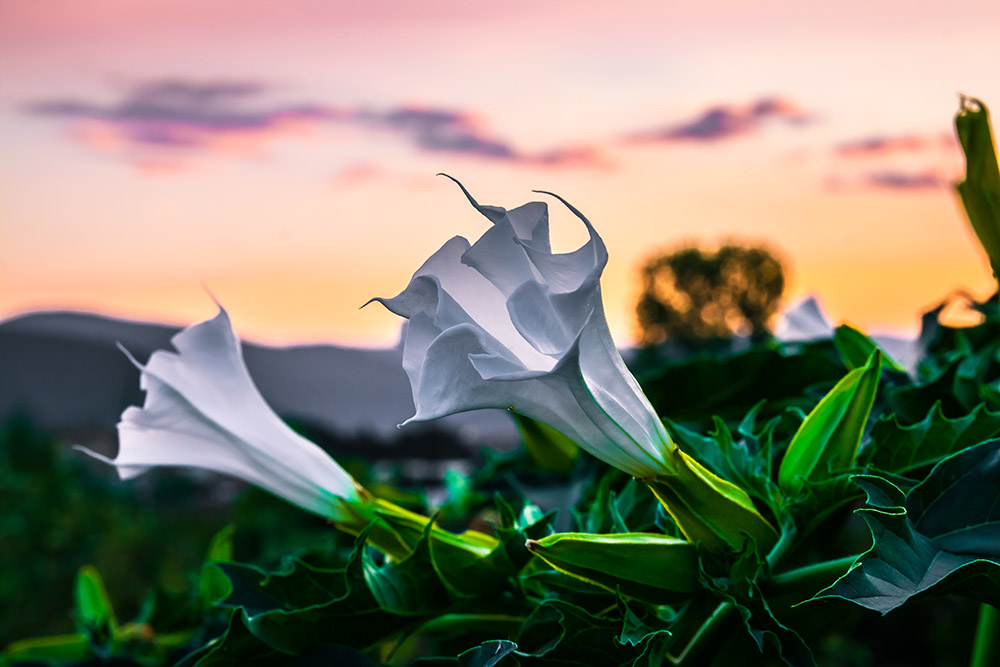Old time herbalists and the Eclectics didn’t focus on common herbs – they mainly used “heroic” medicines instead. These are the toxic herbs, so strong that only 1-2 drops of tincture were generally taken for quick and effective results. Of course such plants are rarely used today, and when they are it’s mainly in homeopathic form.
One such toxic herb, jimson weed, or Datura stramonium, recently caught my attention again. This weed was, and by some still is, used medicinally to stop asthma attacks. Only 1 – 2 puffs are inhaled to stop an attack and no more. It has also been taken internally as an hallucinogen, but most reported experiences are mentally and physically unpleasant, not to mention physically dangerous. This is a “good” thing as using datura to get high is a bad idea at best.[1]
This is because Datura contains the anti-cholinergic alkaloids atropine, hyoscyamine and scopolamine, which interfere with the chemical messenger, acetylcholine, in the brain and nerves. Why does that matter? Because acetylcholine is crucial for processing memory and learning plus provides the ability to distinguish fantasy from reality. Thus, using datura causes an amnesia-like effect on memory.
Jimson weed, or datura, is an aggressive weed that grows all over the classical world. Also known as devil’s snare, it is a plant in the deadly nightshade family. In classical Greek mythology, it may well be the plant that enabled Circe to turn Odysseus’s men into pigs.[2] Circe might have mixed it into the men’s food, which is usually what she is shown doing in ancient art. Its amnesia-like effects would then have helped the men forget their fatherland so they thought they were pigs instead.
Odysseus avoided this fate since he was warned by Hermes who armed him with another plant for protection, snowdrop. Also known as Galanthus nivalis, snowdrop protects against poisons. In fact, its chemical constituent gelantamine (or galanthamine) also present in daffodils and other narcissi, may be helpful in the treatment of Alzheimer’s disease, although it is not a cure.[3] Medicinally, snowdrop is used for neuralgia, nerve inflammation, and to strengthen the brain and nervous system. Interestingly, galanthus protects acetylcholine, thus staving off the effects of memory loss and Alzheimer’s.
If you find Jimson weed growing near you and don’t have any snowdrop for protection, there is other lore of this plant that you can explore. It is said that putting one of the weed’s trumpet-shaped flowers under your pillow at night results in flying dreams. I tried this several times myself, and always dreamt of flying. Was this simply the power of suggestion? Or a result from smelling the constituents in Jimson weed? I don’t know, but there’s further legend that witches “flew on their brooms” with the aid of Jimson weed. I’ll let you figure that one out!
I did bring some Jimson weed seeds home from the Arizona desert once as a pressed flower in my herb notebook. I had thought the plant beautiful and wanted to grow it at home. I never planted the seeds but the next spring, my garden was loaded with datura, which had never grown on our land before. Another magical property of Jimson weed?
[1] Jimson weed is highly toxic and unsafe. It can cause many toxic effects including dry mouth, extreme thirst, vision problems, nausea, vomiting, fast heart rate, hallucinations, seizures, fever, confusion, breathing problems, congestive heart failure, loss of consciousness, and death. It can make those with Down Syndrome, hiatal hernia, GERD, stomach ulcers, ulcerative colitis, intestinal infections, urinary retention, and glaucoma worse. Do NOT use jimson weed. This blog article is for educational purposes only.
[2] “Rooted in Truth”, National Geographic Magazine, November 2015, p 52.
[3] Loy, C; Schneider (25 January 2006). “Galentamine for Alzheimer’s disease and mild cognitive impairment”. Cochraine Database Syst Rev(1); CD001747, doi:10.1002/14651858 CD001747.pub3. PMID 16437436.

